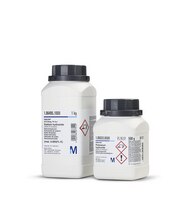104616 Supelco氯化羥銨
GR for analysis ACS,ISO,Reag. Ph Eur
More>> GR for analysis ACS,ISO,Reag. Ph Eur Less<<Synonyms: Hydroxylamine hydrochloride
Recommended Products
Overview
| Replacement Information |
|---|
Key Spec Table
| CAS # | EC Number | Hill Formula | Chemical Formula | Molar Mass | Grade Value |
|---|---|---|---|---|---|
| 5470-11-1 | 226-798-2 | ClH₄NO | NH₂OH * HCl | 69.49 g/mol | ACS,ISO,Reag. Ph Eur |
Products
| Catalogue Number | Packaging | Qty/Pack | |
|---|---|---|---|
| 1.04616.0250 | 塑膠瓶 | 250 g | |
| 1.04616.1000 | 塑膠瓶 | 1 kg |
| Description | |
|---|---|
| Catalogue Number | 104616 |
| Synonyms | Hydroxylamine hydrochloride |
| References |
|---|
| Product Information | |
|---|---|
| CAS number | 5470-11-1 |
| EC index number | 612-123-00-2 |
| EC number | 226-798-2 |
| Grade | ACS,ISO,Reag. Ph Eur |
| Hill Formula | ClH₄NO |
| Chemical formula | NH₂OH * HCl |
| Molar Mass | 69.49 g/mol |
| HS Code | 2825 10 20 |
| Quality Level | MQ100 |
| Applications |
|---|
| Biological Information |
|---|
| Physicochemical Information | |
|---|---|
| Density | 1.67 g/cm3 (25 °C) |
| Melting Point | 154 °C |
| pH value | 2.5 - 3.5 (50 g/l, H₂O, 20 °C) |
| Vapor pressure | 0.054 Pa (50 °C) |
| Bulk density | 900 kg/m3 |
| Solubility | 470 g/l |
| Dimensions |
|---|
| Materials Information |
|---|
| Toxicological Information |
|---|
| Safety Information | |
|---|---|
| Categories of danger | explosive, harmful, irritant, carcinogenic, sensitizing, dangerous for the environment |
| Product Usage Statements |
|---|
| Storage and Shipping Information | |
|---|---|
| Storage | Store at +2°C to +30°C. |
| Packaging Information |
|---|
| Supplemental Information |
|---|
| Global Trade Item Number | |
|---|---|
| Catalogue Number | GTIN |
| 1.04616.0250 | 04022536053363 |
| 1.04616.1000 | 04022536053387 |
Documentation
氯化羥銨 MSDS
| Title |
|---|
氯化羥銨 Certificates of Analysis
| Product Number | Packaging | Specification | Lot Number |
|---|---|---|---|
| 1.04616.0250 | 塑膠瓶 | PDF Specification Document | |
| 1.04616.1000 | 塑膠瓶 | PDF Specification Document |

















